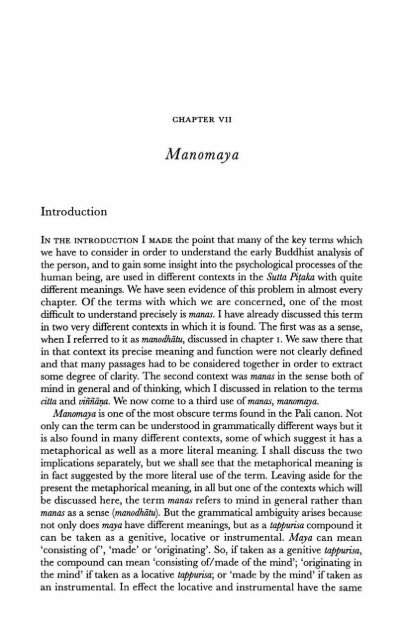Identity and Experience_Hamilton_1996
Identity and Experience_Hamilton_1996
Identity and Experience_Hamilton_1996
You also want an ePaper? Increase the reach of your titles
YUMPU automatically turns print PDFs into web optimized ePapers that Google loves.
CHAPTER VII<br />
Manomaya<br />
Introduction<br />
IN THE INTRODUCTION I MADE the point that many of the key terms which<br />
we have to consider in order to underst<strong>and</strong> the early Buddhist analysis of<br />
the person, <strong>and</strong> to gain some insight into the psychological processes of the<br />
human being, are used in different contexts in the Sutta Pitaka with quite<br />
different meanings. We have seen evidence of this problem in almost every<br />
chapter. Of the terms with which we are concerned, one of the most<br />
difficult to underst<strong>and</strong> precisely is manas. I have already discussed this term<br />
in two very different contexts in which it is found. The first was as a sense,<br />
when I referred to it as manodha'tu, discussed in chapter I. We saw there that<br />
in that context its precise meaning <strong>and</strong> function were not clearly defined<br />
<strong>and</strong> that many passages had to be considered together in order to extract<br />
some degree of clarity. The second context was manas in the sense both of<br />
mind in general <strong>and</strong> of thinking, which I discussed in relation to the terms<br />
citta <strong>and</strong> vin"n"a'pz. We now come to a third use of manas, manomaya.<br />
Manomaya is one of the most obscure terms found in the Pali canon. Not<br />
only can the term can be understood in grammatically different ways but it<br />
is also found in many different contexts, some of which suggest it has a<br />
metaphorical as well as a more literal meaning. I shall discuss the two<br />
implications separately, but we shall see that the metaphorical meaning is<br />
in fact suggested by the more literal use of the term. Leaving aside for the<br />
present the metaphorical meaning, in all but one of the contexts which will<br />
be discussed here, the term manas refers to mind in general rather than<br />
manas as a sense (manodha'tu). But the grammatical ambiguity arises because<br />
not only does maya have different meanings, but as a tappuka compound it<br />
can be taken as a genitive, locative or instrumental. Maya can mean<br />
'consisting of', 'made' or 'originating'. So, if taken as a genitive tappurisa,<br />
the compound can mean 'consisting of/made of the mind'; 'originating in<br />
the mind' if taken as a locative tappurisa; or 'made by the mind' if taken as<br />
an instrumental. In effect the locative <strong>and</strong> instrumental have the same


